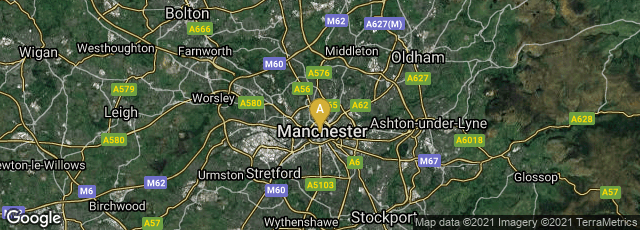

A: Manchester, England, United Kingdom
Printing machinery was introduced to provincial England decades after it was used in London, occasionally resulting in opposition to the introduction of machinery years after it had become accepted in London:
"We hear, for example, in 1842, that the Manchester Society had 'engaged in useless strikes--ruinous, ridiculous, and unjust contests against the employment of machinery. There is, however, no evidence of violent opposition or machine breaking. Although the machines gradually displaced hand pressmen, they created added employment for hand compositors. Opposition was futile, in any case, and typographical societies were forced to modify their attitude so as to maintain control over the press department. The Manchester Society required the machines to be worked by its members and even passed a rule that 'on any printing machine used ... none but journeymen or apprentices shall be employed in feeding the machine'. But this rule was expunged in 1847, the committee considering it 'hardship and injustice that apprentices to the printing business should be compelled to waste their time in feeding machines'. Employers were therefore 'allowed to employ such persons as they may think proper to feed machines', but these people, labourers or unbound boys and girls, were 'not allowed to interfere in any other manner in connection with the machine, or in any other department of the printing business'.
"Even 'machine-minding' or 'managing' was regarded by journeymen printers as somewhat degrading and consequently some of the larger employers, using several machines, began to bind apprentices exclusively to that department, thus creating a specialised class of 'machinemen'. Specialisation was inevitable as the industry expanded, but throughout the second half of the century 'twicing' was common: the great majority of firms had only one or two machines, worked intermittently by compositors. 'Not till some time had elapsed after the introduction of machinery in the provinces did machine minders exist to any extent as a separate class" (Musson, Trade Union and Social History [1974] 102).